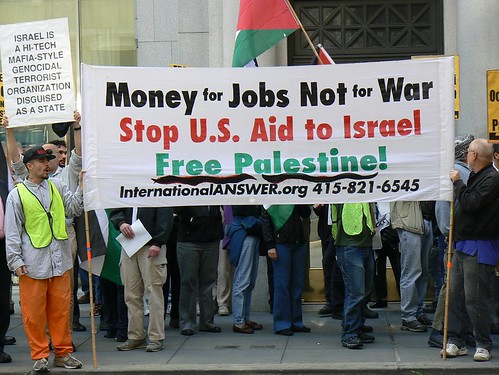___________________________
"Local Group Wants Israeli Goods Off Rainbow Shelves"
By Lorraine Sanders
Neighborhood Newswire (San Francisco Bay Area)
http://www.sfpower.org/newswire/healthconsum14.php
February 28 , 2007
Reviving an effort that was defeated by pro-Israel activists four years ago, a group of Bay Area residents under the umbrella organization the Rainbow Boycott Israeli Goods (RBIG) hopes to convince worker-owned Rainbow Grocery, the longtime San Francisco purveyor of organic and health foods, to remove Israeli products from its shelves. "Rainbow is a community-based store that takes great pride in being for the environment and ecology. It came out of the 60's movement, and those kinds of values are really in line with a boycott of Israeli goods," says RBIG supporter Rachel West.
West, a San Francisco resident who has worked at the coop for 21 years, says a boycott of Israeli goods would raise awareness about alleged Israeli war crimes and injustices the group believes were committed during last summer's war with Hezbollah, as well as the ongoing turmoil between Israel and Palestinians. West stresses that her views are strictly her own, and that she in no way represents the store or its policies.
RBIG launched its latest campaign to remove Israeli products from the shelves at Rainbow Grocery after the Israel-Hezbollah war last summer. Since then the group has circulated petitions asking shoppers to demand that the store remove Israeli products; held a fundraiser; and placed a video on YouTube that features RBIG supporters explaining their reasons for supporting the boycott. In early January, the Bay View Newspaper published an "Open Letter to Rainbow Grocery Cooperative," signed by 51 activists, that accused the store of stonewalling and refusing to address the boycott issue.
Rainbow Grocery carries only a handful of Israeli products; Rainbow Grocery Board Member Scott Bradley estimates the total number at less than a dozen. But RBIG supporters say the boycott is less about causing economic harm to Israel as it is about publicizing the adverse consequences of the chronic Israeli-Palestinian conflict.
"It's an opportunity for people to get more information about what the costs [of Israeli policy] are to Palestinians and what the costs are to Israelis," says Nell Myhand, an Oakland resident and Rainbow shopper who has supported RBIG's efforts since 2003.
While RBIG has its supporters other Rainbow shoppers oppose the boycott. "It's such a slippery slope to forbid the selling of products from any given country. Then what? Do you not allow any products from any country for its sins?" asks Leslie Crawford, a San Franciscan who regularly shops at the store.
West, who’s Jewish and immigrated to the United States from South Africa more than two decades ago, likens Israel's treatment of Palestinians to the Apartheid system, which began to crumble only after international boycotts placed long-term pressure on the African nation's economy. "I feel that it's really time for Jewish people to speak out against Israel. As a Jewish person, I just can't stand by and watch them destroy a whole society," she says.
Yitzhak Santis, of the Jewish Community Relations Council, says West’s viewpoint represents the "fringe of the fringe" of Jewish thought. "Human rights are serious issues, but [the boycott] is an ideological assault on Israel," Santis says.
Boycotting Israeli goods to protest that country’s policies towards the West Bank and Gaza is nothing new. Organizations around the nation, from the U.S. Presbyterian Church to student groups on college campuses support ongoing economic boycotts against Israel.
Rainbow Grocery had, at least in part, participated in a boycott for a few months in 2003, during which individual store departments independently chose to remove Israeli goods from their shelves. When several shoppers inquired about the missing items, workers told them about the boycott. Shoppers opposed to the boycott organized counter-demonstrations that drew dozens of protestors.
"The main point that we made then and would make now is why are they singling out Israel? Why aren't we boycotting products from Saudi Arabia, China, Pakistan, Egypt? There's a large dose of hypocrisy here," Santis says.
After activists and concerned shoppers on both sides of the issue protested outside the store, the negative attention prompted Rainbow Grocery to adopt an official boycott procedure. "Since [a boycott] affects the whole store, everybody got together and said, 'That's not fair,'" Bradley says of the individual departments' decision to stop stocking Israeli products. According to a statement posted on Rainbow's web site in earlier this year, the store's worker-owners voted the boycott down after the official boycott procedures were put into place in 2003.
While RBIG says it has support among Rainbow's worker-owners, Bradley says the number is actually very small. "I think that a couple of workers here are a part of that group, and, from time to time, they renew their cause," he said. Rainbow’s official response to calls for a boycott, as stated on its website, is that "ultimately this decision must be made by the over 200 members that collectively make up Rainbow Grocery.” At press time, no worker-owners had begun the official boycott proposal process.
For its part, RBIG plans to continue advocating for divestment from Israeli goods both at Rainbow Grocery and beyond. The group is currently planning to take its concerns to other Bay Area grocery stores.
You can read Rainbow Grocery's statement online at http://www.rainbowgrocery.org/. To contact RBIG, email rainbowbig@earthlink.net .
















No comments:
Post a Comment